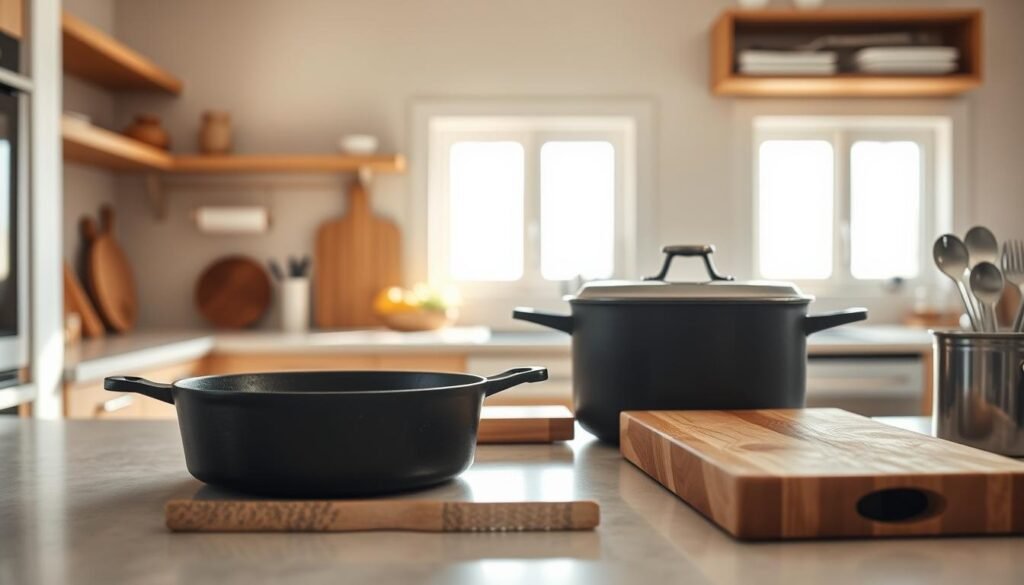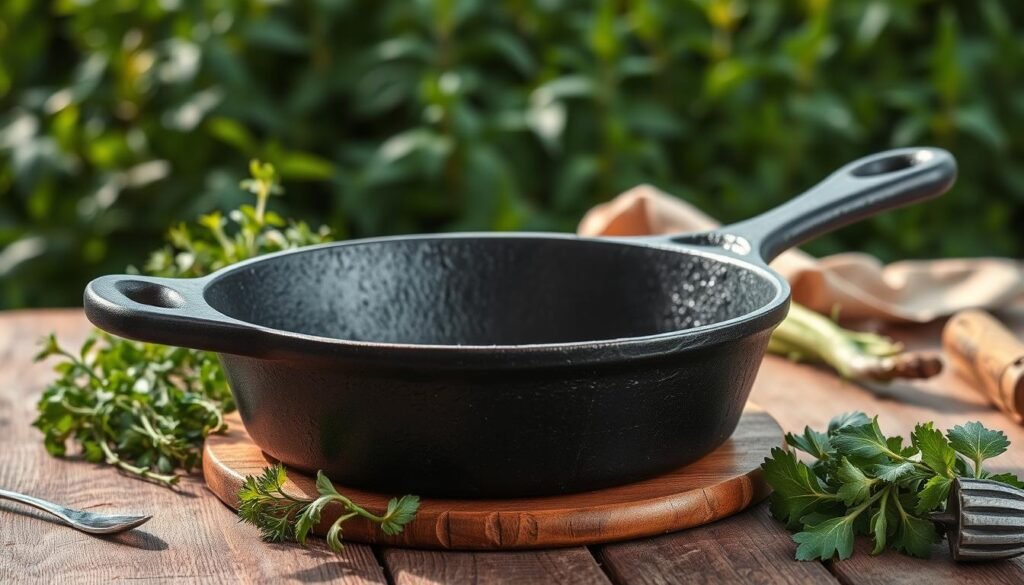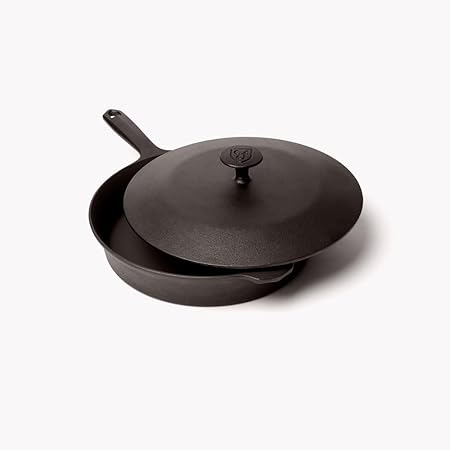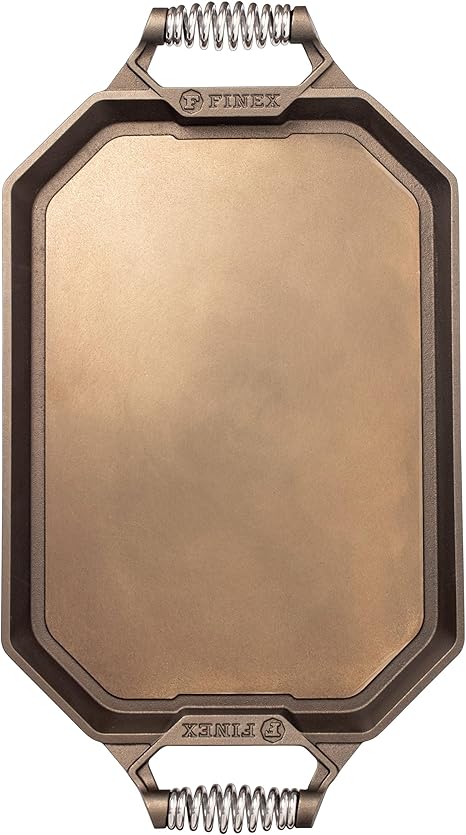
we may earn a small commission links on this post (at no extra cost to you). Thank you for supporting HappyEcoHut!
Do you know the health risks of your cookware? Many of us don’t, and it’s a hidden danger in our kitchens. Luckily, there are healthier options. Cast iron pans and griddles are great. They’re durable and healthy for cooking. They help avoid toxins found in regular cookware.
In this article, we’ll explore non-toxic cooking with cast iron pans and Dutch ovens. We’ll look at their benefits and how they can improve your cooking.
The Health Risks of Conventional Cookware
Conventional cookware might be cooking more than just your meals. It could be adding toxic materials to them. When we cook, we’re not just making food. We’re also exposing ourselves to harmful chemicals from the cookware.
These chemicals can get into our food, mainly when cooking at high temperatures or with acidic ingredients. This is a big concern because it can harm our health.
Common Toxic Materials in Kitchen Utensils
Many conventional cookware materials contain toxic substances. These include PFOA, PTFE, lead, and cadmium. These chemicals are often used in non-stick coatings or in the manufacturing process.
For example, PFOA and PTFE are found in non-stick pans. Lead and cadmium can be in the glazes of some ceramic cookware.
| Toxic Material | Common Use | Health Risk |
|---|---|---|
| PFOA | Non-stick coatings | Cancer, thyroid disease |
| PTFE | Non-stick coatings | Polymer fume fever, cancer |
| Lead | Ceramic glazes | Neurological damage, developmental issues |
| Cadmium | Ceramic glazes, solders | Kidney damage, cancer |
How Chemicals Leach into Food During Cooking
Chemicals from cookware can leach into food in different ways. High heat can break down non-stick coatings. This releases toxic fumes and particles into the air and food.
Acidic foods, like tomatoes, can also react with certain materials. This causes them to leach into the food. For example, cooking acidic dishes in a pot with a lead glaze can lead to lead contamination.

Why Choose Non-Toxic Cookware-Cast Iron Pans
Cast iron pans and Dutch ovens are more than just cooking tools. They offer a healthier way to cook without toxic materials. Choosing cast iron means you’re picking a method that’s good for your health and the planet.
Let’s explore why cast iron is a top choice for non-toxic cooking.
Health Benefits of Chemical-Free Cooking
Cooking with cast iron pans and Dutch ovens means avoiding harmful chemicals. These chemicals can get into your food, which is bad when you cook at high temperatures.
Switching to cast iron lowers your risk of health problems. It also helps keep more nutrients in your food, making your diet healthier.
Environmental Impact of Sustainable Cookware
Cast iron cookware is also great for the environment. It’s made from natural resources and lasts a long time with the right care. This means you don’t need to replace it often, which helps reduce waste. At the end of its life, cast iron can be recycled. This makes it even better for the planet.
| Cookware Material | Durability | Health Safety |
|---|---|---|
| Cast Iron | High | High |
| Non-Stick Coated | Low | Low |
| Stainless Steel | High | High |

Understanding Cast Iron: A Time-Tested Kitchen Essential
Cast iron cookware gives even heat distribution. They cook food perfectly and has been a kitchen staple for generations. Its lasting popularity shows its quality and performance.
The Science Behind Cast Iron Cooking
Cast iron’s cooking performance comes from its iron and carbon makeup. This material holds and spreads heat well. So, your food cooks evenly.
The thermal mass of cast iron pans is key. They keep heat, making them great for slow cooking and searing. This is perfect for dishes needing steady, high heat.
Seasoning Process and Natural Non-Stick Properties
Seasoning makes cast iron pans non-stick. It involves oiling the pan and heating it to harden the oil. This prevents food from sticking and protects the iron from rust.
To keep the non-stick surface, re-season your pans often. Here are some tips:
- Clean the pan gently after use to avoid stripping the seasoning.
- Apply a thin layer of oil to the pan after cleaning and heating to keep the seasoning.
- Avoid using abrasive cleaners or scourers that can damage the seasoning.
Top Cast Iron Skillets for Everyday Cooking
we’ve searched the market to find the best cast iron skillets for you. They’re perfect for both seasoned chefs and beginners. Let’s explore the top cast iron skillets for everyday cooking, including their features and benefits.
Lodge Classic Cast Iron Skillet
The Lodge Classic Cast Iron Skillet is a classic choice. It’s made from durable cast iron, ideal for many cooking methods. It’s also a healthy cooking option because it distributes heat evenly. This skillet is pre-seasoned, so you can use it right away. It’s made in the USA and has a comfortable handle for easy handling.
Pros
- Durable and long-lasting
- Even heat distribution
- Versatile for stovetop, oven, or camping use
Cons
- Heavy
- Surface may be rough
Field Company Cast Iron Skillet
The Field Company Cast Iron Skillet is sleek and eco-friendly. Designed by two Brooklyn brothers and made in the USA from 75-90% recycled cast iron, Field Skillets are machined and polished to give a smoother finish and weigh less compared to traditionally made cast iron skillets. It’s perfect for those who want a non-toxic cooking experience and those who care about sustainable living.
Pros
- Smooth, machined finish
- Lightweight compared to other cast iron skillets
- Eco-friendly manufacturing process
Cons
- More expensive than some other options
- May require additional seasoning
Stargaze Cast Iron Skillet
Elevate your cooking experience with the Stargazer Skillet—a revolutionary blend of timeless cast iron durability and sleek, contemporary design. Crafted for chefs who demand precision, sustainability, and style, this skillet isn’t just cookware—it’s an heirloom in the making.
Pros
- Exceptional heat retention
- Beautiful, polished finish
- Stay cool handle
Cons
- Higher price point
- May require re-seasoning
Specialty Cast Iron Cookware for Specific Cooking Needs
Specialty cast iron cookware meets specific cooking needs, adding versatility to your kitchen. Whether you’re aiming for perfect pancakes or a grilled steak, there’s a cast iron piece for you.
Lodge Cast Iron Griddle
The Lodge Cast Iron Griddle is great for cooking large amounts of food. It’s perfect for family breakfasts or brunch. Its large surface lets you cook many pancakes, eggs, or burgers at once.
Pros
- Large cooking surface
- Durable cast iron construction
- Affordable price point
Cons
- Requires seasoning
- Can be heavy
.
Finex Cast Iron Grill Pan
The Finex Cast Iron Grill Pan is for those who love grilled food and jaw-dropping presentation. This grill pan is great for getting grill marks on steaks and veggies indoors.
Pros
- Unique shapes for grill marks
- Polished finish for a premium look
- Versatile for various cooking tasks
Cons
- Higher price point
- Requires maintenance
Care and Maintenance of Cast Iron Cookware
Keeping your cast iron pans in good shape is simple. With a few easy steps, your cookware will stay healthy and eco-friendly for many years.
Proper Cleaning Techniques
Cleaning your cast iron is easy. Just don’t use harsh chemicals or soap, as they can damage the seasoning. Wipe out any leftover food with a paper towel and then rinse with warm water. For stubborn food, make a paste with kosher salt and water, and gently scrub with a soft sponge.
If food sticks, use some effort to remove it. But remember to re-season your pan afterward to keep it non-stick.
Re-Seasoning Methods
Re-seasoning your cast iron is simple. Just apply a thin layer of oil and bake it in the oven. Preheat your oven to 350°F (175°C). Rub a thin layer of oil all over the pan, making sure to cover every spot. Place the pan upside down on the middle rack and bake for an hour. Let it cool before wiping off any extra oil with a paper towel.
If your pan has stubborn rust, you might need to re-season it a few times to get it right.
Storage Best Practices
To store your cast iron, make sure it’s dry. You can dry it in the oven at a low heat for a few minutes. Then, apply a thin layer of oil to prevent rust. Store your pans in a dry place or hang them on a hook. Just make sure they’re not stacked or crowded, as this can cause scratches.
Your Path to Healthier Cooking with Cast Iron
Cast iron pans are great for healthier cooking. They are a smart choice for your kitchen. Choosing cast iron means you’re caring for your health.
Start using cast iron to cook healthier meals. It’s perfect for everyone, whether you’re experienced or new to cooking. Cast iron is durable and versatile, making it a great addition to your kitchen.
Switching to cast iron is a big step towards better cooking. You’ll enjoy cooking with non-toxic, sustainable cookware. Your kitchen and body will thank you for it.













